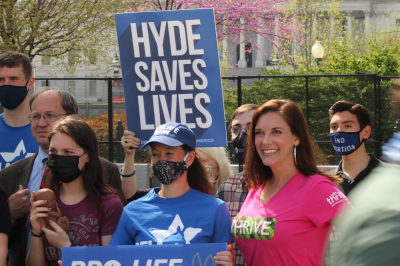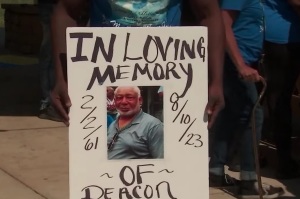Women share their abortion stories: 'The life was just sucked out of me, too'
Catherine Glenn Foster

Catherine Glenn Foster never thought much about the topic of abortion until she found herself unexpectedly pregnant at the age of 19 and in need of help.
Alone and scared, she eventually sought answers from Google, which directed her to an abortion facility in Georgia near her school.
Foster was a sophomore in college at the time, and she learned that she was pregnant after her school's Christmas break ended. The abortion happened in February 2001 at a clinic outside of Atlanta that is no longer in operation.
"In a way, it was like any doctor's office," the former president and CEO of Americans United for Life told The Christian Post in an interview. "But in another way, it was like, of all places — places where women are trying to decide, this is where women are needing counseling — it was odd how alone we all were."
Before the abortion, Foster was walking on campus one day in her boyfriend's oversized sweatshirt when she suddenly thought of the name Maggie for her unborn child. She does not know how she thought of that name, as she never learned if the baby had been a boy or a girl.
"I'm walking around campus, holding my stomach and just talking to her," she said. "I was comforting myself and my child, saying, 'It's OK. We're going to get through this. We'll be OK.'"
Foster hadn't decided what she wanted to do, and although she called the facility looking for information, she believes that the staff went ahead and booked her for an abortion anyway. Her boyfriend and the father of her child took her to the appointment, and while sitting in the waiting room, the pair could hear the other women discussing their previous abortions.
"And I remember there was one woman who had been there eight times," Foster said. "Most were more on the two to three range. I seemed to be the only one who was there for her first."
When the staff called Foster into the back room, she said they did not allow her boyfriend to accompany her, which she thought would've been helpful to have him there due to how scared she was at the time.
While lying on a table, Foster recalled craning her neck to try to see her baby as the facility performed an ultrasound with the screen turned away from her. When she asked to see the screen, she said the employee conducting the ultrasound refused, saying it was against the clinic's policy to allow her to look.
At first, it seemed that Foster was not far enough along for an abortion, as she was only in the first few weeks of her pregnancy. The pro-life advocate told CP that she took this news as a sign that she was not meant to have an abortion, but then the clinic employee checked again.
"She said, 'Oh, I was wrong. Actually, you are far enough along, but just barely,'" Foster remembers the clinic employee saying. "'So, it's fine. We can go ahead and do it today.'"
"It just suddenly hit me: This is not what I want; this is wrong," she continued. "This is a life, and at that point, I started to feel a heavy weight. And the doctor came in and was starting to get ready, and I said: 'This is not right for me. I just want to go; you can keep the money. I'm going to go and figure something else out."
As she tried to stand, she said the female clinic employee who had been sitting next to Foster continued to hold onto her hand as the doctor attempted to conduct the abortion. Foster said she kept trying to leave but the woman holding her hand called for backup.
"These three other people showed up, and they ended up holding me down," she said. "One on each arm, one on each leg; they just held me there."
According to Foster, as the staff held her down, the doctor continued prepping her for the abortion. She is not sure of the exact moment when she started to scream, but when she did, Foster said that one of the clinic employees placed a hand over her mouth.
"I just remember hearing the sound of the machine and trying to scream and wanting to escape," Foster said. "And then, by the time it was over, I guess I should have been angry or something, but I was just defeated."
"I felt like the life was just sucked out of me, too," she added.
The staff brought the then-teenaged Foster to the recovery room, where she finally let the tears fall. After they provided her with a drink and a cookie, Foster said the abortion clinic employees told her it was time to go, but she didn't want to leave. Foster wanted to stay because, at that moment, her one solace was that she was in the same building as her deceased unborn child.
Eventually, she said the staff brought Foster's boyfriend in from the waiting room to take her outside of the clinic, and he loaded her into the car. There was silence as the pair drove back to campus, and Foster said she also cried during the drive.
Returning to campus, Foster retreated to her dorm and wept, and she remained there for at least a couple of weeks. One month after the abortion, the sophomore finally told her mom what had happened. She had been afraid to tell her mom, who had mostly raised Foster on her own, that she was pregnant, thinking that the revelation would disappoint her.
She said her mother helped her find counseling through a pregnancy center in Johnson City, Tennessee, called Agape Women's Services. According to Foster, she is still friends with the counselor she met through the pregnancy center to this day.
As for her boyfriend, the couple's relationship ended one year after the abortion. After the abortion, the baby's father recognized the experience had been traumatic for Foster, but she said it just wasn't a good relationship, and she broke things off.
Eventually, Foster graduated college, started working, and obtained a master's degree. However, things changed for her after she attended an orientation on healthcare law when she began law school.
"I'm sitting there, and I just get one of the clearest calls that God has ever put on my life," Foster said. "It was just: 'You are here in law school to help women like you with babies like yours. You're here for humanity; you're here for the vulnerable, the disenfranchised."
In a time when pro-life advocates are considering how to best move forward following the reversal of Roe v. Wade, Foster contended that the movement was not ready for the Supreme Court to reverse the 1973 ruling that legalized abortion nationwide. However, she added that no one is ever prepared for change.
"People are often unready for a child; even when they think they're ready, and it's a planned child, they're still often not ready," she told CP. "It's not a perfect time, but it's a blessing because human life is always a blessing, even when it does not feel like it."
Regarding whether the pro-life movement should pursue a federal 15-week abortion ban or focus on passing laws at the state level, Foster called on pro-lifers to pursue every possible front. The pro-life attorney also held up Idaho's abortion law as an example of what she would like to happen in every state.
"I want a federal constitutional amendment that protects life," she said. "I want to pursue all of these things; however, we need a game plan."
"We have to be very cautious," Foster added about the passing of pro-life laws. "We have to make sure we have the funding, the financing, the messaging, all of that in line."
Samantha Kamman is a reporter for The Christian Post. She can be reached at: samantha.kamman@christianpost.com. Follow her on Twitter: @Samantha_Kamman




























